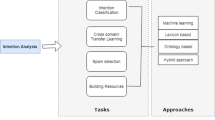Summary
The intention recognition module identifies the analyzed representation of the user input to the SmartKom system that best represents this input in a collection of possible representations. The alternative representations are generated by recognition and analysis components, being enriched with knowledge, e.g., from the discourse and context. A probabilistic model combines various scores, based on features in the representations and computed by the SmartKom modules during processing to support the selection. The parameters inside the model are optimized on annotated data that has been collected using the SmartKom system using both a parameter study and a rank based estimation algorithm.
Access this chapter
Tax calculation will be finalised at checkout
Purchases are for personal use only
Preview
Unable to display preview. Download preview PDF.
Similar content being viewed by others
References
P. Billingsley. Probability and Measure. JohnWiley, New York, 3 edn., 1995.
R. Engel and N. Pfleger. Modality Fusion, 2006. In this volume.
M. Fleming and R. Cohen. Dialogue as Decision Making Under Uncertainty: The Case of Mixed-Initiative AI Systems. In: Proc. NAACL-2001 Adaptation in Dialogue Systems Workshop, Pittsburgh, PA, 2001.
I. Gurevych, R. Malaka, R. Porzel, and H.P. Zorn. Semantic Coherence Scoring Using an Ontology. In: Proc. Human Language Technology Conference / North American Chapter of the Association for Computational Linguistics Annual Meeting 2003, pp. 88–95, Edmonton, Canada, 2003.
G. Herzog and N. Reithinger. The SmartKom Architecture: A Framework for Multimodal Dialogue Systems, 2006. In this volume.
M. Löckelt. Plan-Based Dialogue Management for Multiple Cooperating Applications, 2006. In this volume.
N. Pfleger, R. Engel, and J. Alexandersson. Robust Multimodal Discourse Processing. In: Proc. Diabruck: 7th Workshop on the Semantics and Pragmatics of Dialogue, Wallerfangen, Germany, 4–6 September 2003.
T. Portele, S. Goronzy, M. Emele, A. Kellner, S. Torge, and J. te Vrugt. SmartKom-Home — An Advanced Multi-Modal Interface to Home Entertainment. In: Proc. EUROSPEECH-03, Geneva, Switzerland, 2003.
R. Porzel, I. Gurevych, and R. Malaka. In Context: Integrating Domain-and Situation-Specific Knowledge, 2006. In this volume.
W.H. Press, W.T. Vetterling, S.A. Teukolsky, and B.P. Flannery. Numerical Recipes in C++ — The Art of Scientific Computing. Cambridge University Press, Cambridge, UK, 2 edn., 2002.
N. Roy, J. Pineau, and S. Thrun. Spoken Dialogue Management Using Probabilistic Reasoning. In: Proc. 38th ACL, Hong Kong, 2000.
M. Streit. Problematic, Indirect, Affective, and Other Non-Standard Input Processing, 2006. In this volume.
M. Streit, A. Batliner, and T. Portele. Emotion Analysis and Emotion Handling Subdialogs, 2006. In this volume.
W. Wahlster, N. Reithinger, and A. Blocher. SmartKom: Multimodal Communication with a Life-like Character. In: Proc. EUROSPEECH-01, vol. 3, pp. 1547–1550, Aalborg, Denmark, September 2001.
World Wide Web Consortium (W3C) / XSL Working Group. The Extensible Stylesheet Language Family. http://www.w3.org/Style/XSL. Cited 6 April 2006.
S. Young. Probabilistic Methods in Spoken Dialogue Systems. Philosophical Transactions of the Royal Society (Series A), 358(1769):1389–1402, 2000.
Author information
Authors and Affiliations
Editor information
Editors and Affiliations
Rights and permissions
Copyright information
© 2006 Springer-Verlag Berlin Heidelberg
About this chapter
Cite this chapter
te Vrugt, J., Portele, T. (2006). Intention Recognition. In: Wahlster, W. (eds) SmartKom: Foundations of Multimodal Dialogue Systems. Cognitive Technologies. Springer, Berlin, Heidelberg . https://doi.org/10.1007/3-540-36678-4_19
Download citation
DOI: https://doi.org/10.1007/3-540-36678-4_19
Publisher Name: Springer, Berlin, Heidelberg
Print ISBN: 978-3-540-23732-7
Online ISBN: 978-3-540-36678-2
eBook Packages: Computer ScienceComputer Science (R0)




